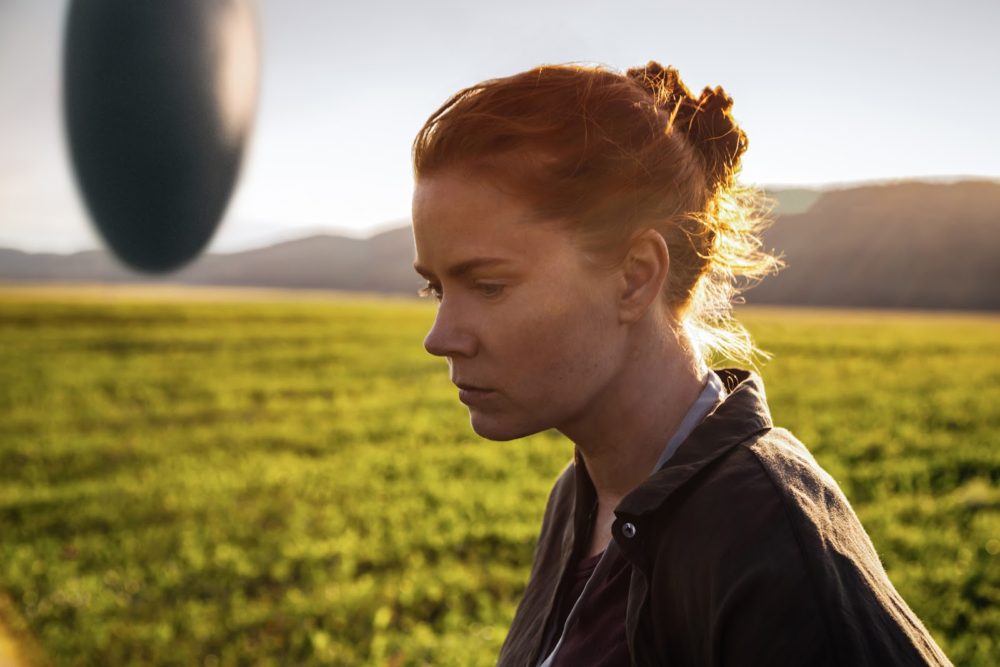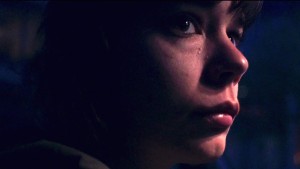
Half of Arrival plays like a straight sci-fi film, one in which Amy Adams’ Dr. Louise Banks is called upon by the military to serve as their key linguist/translator between a recently landed alien race and humanity. This is where director Denis Villeneuve flourishes: dark spaces that are practically claustrophobic whether they’re packed with people or empty, the slow development of mystery, and bringing out the best of the actor playing a troubled protagonist.
The other half—in part subtly mixed in throughout and in part heavily featured in the latter half of the film due to an overly sentimental script courtesy of Eric Heisserer—is more like what you’d expect from Terrence Malick if he tackled a story that featured scenes from different time periods flowing almost interchangeably. While these halves together beautifully on occasion, it’s here where filmmaker ambitions get the best of Arrival, barreling through plot points in order to come to a neat closing (punctuated by the worst line Jeremy Renner has had to deliver in his career, taken from the very first paragraph of Ted Chiang’s “Story of Your Life”).
In adapting Chiang’s short story, Villeneuve finds a perfect companion in Heisserer; the script feels like an extension of everything the director has found pleasure in exploring throughout his career. Arrival’s alien designs are wildly inventive in their form of communication—something essential to the riveting and occasionally confounding nature of the feature—but they ultimately feel derivative of the Louise Bourgeois statues heavily featured in Enemy, for better or worse (better, in my case). Much like in Sicario, there’s a stark critique of the US military and the way they handle the notion of twelve alien ships landing in twelve countries across the world, though the film has a dash of xenophobia attached in the way it presents the heads of China and Russia as unstable and war-crazy. The same “pressure cooker waiting to blow in the midst of adversity” as Prisoners lingers in the way many individuals react to the mystery of what the aliens’ purpose on Earth is.
Villeneuve and DP Bradford Young exemplify this with their moody and often dark lighting (though the projection at my screening was admittedly and unfortunately dim), only contrasting this with the almost blinding nature of the fog the aliens inhabit, their pitch black symbols popping all the more because of it. Shifts in gravity are beautifully presented, with the camera tilting as the characters themselves find their balance in an unfamiliar realm. But for all the ways that the film tries to ground itself in a very human exploration of an alien invasion, even making the interactions between anything crafted by special effects feel real, its approach to memory through editing doesn’t always work.
What first feels like a natural flow of memory—initially accompanied by the aforementioned Malickian narration courtesy of Adams—becomes a convoluted way to escape any danger that the narrative set up, disjointing itself to an extent but never quite losing the forward momentum provided by Adams’ compelling performance. When the script’s sentimentality overstays its welcome, she grounds the film and it’s worth arguing that Villeneuve is at his best when he’s exploring the way women navigate male-dominated environments (the best parts of Sicario and Polytechnique both involve this), and, truly, Amy Adams is the biggest reason of why Arrival works at all.
—
Directed by Denis Villeneuve; written by Eric Heisserer; based on the short story “Story of Your Life” by Ted Chiang; starring Amy Adams, Jeremy Renner, Forest Whitaker, and Michael Stuhlbarg; 116 minutes.
Arrival is now playing in theaters everywhere.



 Derek
Derek
 Isabelle
Isabelle